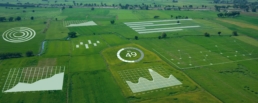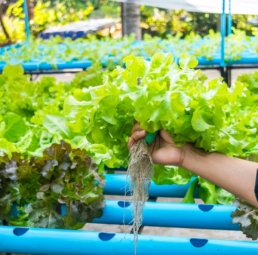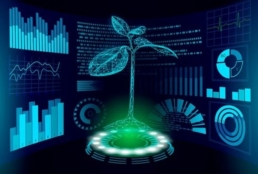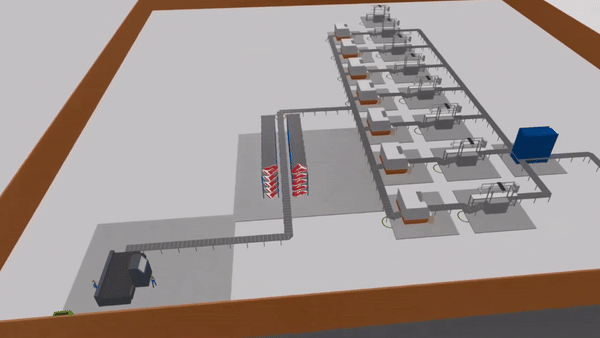In today’s era of advanced technologies, Di-Phy Innovations is pioneering the use of digital twins in the agricultural sector, ushering in a new era of innovation and sustainability. Our digital twin technology offers transformative potential to revolutionise farming practices, optimise resource management, and enhance environmental sustainability.
We invite you to explore the multifaceted applications of digital twins in agriculture with us. Discover how this technology can improve crop yields, streamline operations, and minimise environmental impact, ultimately shaping a more sustainable and productive future for farming. Join Di-Phy Innovations in leading the agricultural sector towards a technologically advanced and eco-friendly horizon.



At Di-Phy Innovations, we leverage digital twin technology to create virtual replicas of farms and agricultural systems, integrating real-time data from sensors, weather stations, and satellite imagery. This advanced technology offers the agricultural sector the ability to gain deep insights into crop growth, soil conditions, water usage, and other vital farming parameters.
Here are several key benefits of employing digital twins in agriculture:
- Optimised Resource Management: Our digital twins offer farmers a comprehensive view of their operations, enabling precise, data-driven decision-making for resource allocation. With the ability to monitor and analyse real-time data, farmers can fine-tune irrigation, fertilisation, and pest control efforts, which leads to reduced waste and increased crop yields.
- Predictive Analytics: Utilising advanced machine learning algorithms, our digital twins analyse historical data to forecast future farming conditions. This predictive capability allows farmers to foresee potential crop diseases, pest infestations, and adverse weather conditions, taking proactive steps to mitigate risks and enhance farm productivity.
- Crop Monitoring and Yield Optimisation: Digital twins provide continuous monitoring of crop growth, offering insights into soil moisture, nutrient levels, and environmental factors. This real-time data enables farmers to adapt their strategies to maximise both crop yield and quality.
- Smart Irrigation: By harnessing real-time data on soil moisture and weather conditions, our digital twins facilitate the optimisation of irrigation practices. This not only helps conserve water but also minimises the environmental footprint of agricultural activities.
At Di-Phy Innovations, we are dedicated to pushing the boundaries of agricultural technology, empowering you to harness the full potential of digital twin technology for sustainable and efficient farming operations.
At Di-Phy Innovations, we extend the application of digital twin technology to industrial farming operations by creating virtual replicas of entire farming systems, including machinery, equipment, and production processes. This advanced approach provides organisations in the agricultural sector with critical insights into their operations, offering numerous advantages:
- Process Optimisation: Our digital twins enable farmers and agricultural managers to simulate and refine complex production processes such as crop processing, packaging, and distribution. By analysing data and running detailed simulations, users can identify bottlenecks, streamline operations, and significantly improve overall efficiency.
- Predictive Maintenance: Digital twins provide a continuous real-time overview of the condition of machinery and equipment. Utilising data from sensors and IoT devices, our technology helps predict maintenance needs, detect potential issues before they lead to failures, and minimise downtime, thereby optimising productivity.
- Quality Control: Through digital twins, farmers can consistently monitor and manage quality parameters across various stages of the production process. Integrating data from sensors and automated systems ensures that the final agricultural products meet consistent quality standards and comply with regulatory requirements.
By implementing Di-Phy Innovations’ digital twin technology in processing plants, you can achieve superior control over agricultural production processes, ensuring efficiency, sustainability, and high-quality outputs. This strategic technology empowers leaders to enhance operational visibility and decision-making capabilities, driving significant advancements in agricultural operations.
At Di-Phy Innovations, we recognise the transformative impact of the Internet of Things (IoT) on agriculture. Integrating IoT devices and sensors with our digital twin technology allows farmers to capture and analyse real-time data on environmental conditions, soil moisture, temperature, and crop health. This integration provides organisations with the tools necessary to enhance decision-making, automate operations, and optimise resource utilisation. Here are key areas where IoT is revolutionising farming:
- Precision Agriculture: Our IoT solutions enable precision agriculture by supplying detailed information about soil conditions, nutrient levels, and crop health directly to farmers. This precise data allows for the targeted application of fertilisers, pesticides, and water, significantly reducing waste and increasing crop productivity.
- Smart Farming: IoT devices facilitate the automation of farming processes, including irrigation, pest control, and livestock monitoring. By combining IoT with digital twins, farmers can remotely monitor and manage their operations efficiently, leading to considerable savings in time and resources.
- Data-Driven Decision Making: The integration of IoT-generated data with advanced analytics and machine learning algorithms empowers farmers with data-driven insights. Analysing extensive datasets helps farmers understand crop performance, enhance resource management, and foster sustainable agricultural practices.
Di-Phy Innovations is dedicated to leveraging IoT to deliver cutting-edge solutions that enable the agricultural sector to navigate the challenges of modern farming and lead their businesses towards a more productive and sustainable future.
At Di-Phy Innovations, we recognise the critical role digital twins play in promoting environmental sustainability within the agricultural sector. By providing real-time, precise data on various aspects of farming operations, digital twins help reduce the ecological footprint and enhance the efficiency of resource management. Here’s how our digital twin technology supports environmental sustainability:
- Optimised Resource Usage: Digital twins provide farmers with immediate insights into soil moisture, nutrient levels, and weather conditions, enabling precise management of critical resources like water and fertilisers. This precision reduces waste and diminishes the environmental impact associated with traditional farming methods.
- Precise Pest Control: Integrating digital twins with IoT devices allows farmers to closely monitor pest populations and deploy targeted control measures. This approach reduces the reliance on broad-spectrum pesticides, decreasing chemical usage and lessening its harmful effects on the surrounding environment.
- Conservation of Biodiversity: Our digital twins help farmers maintain and enhance biodiversity on their lands. By tracking biodiversity indicators such as pollinator populations and the presence of natural pest predators, digital twins aid in the implementation of farming practices that promote a balanced, healthy ecosystem.
Di-Phy Innovations is committed to leveraging advanced technologies like digital twins to help the agricultural industry not only achieve better yields but also implement sustainable practices that contribute positively to the environment.
At Di-Phy Innovations, we affirm that digital twins have a significant role in reducing the carbon footprint of agricultural operations. By optimising resource use, minimising waste, and facilitating the adoption of sustainable practices, digital twins enhance the overall environmental sustainability of farming. Here are specific ways digital twins can help agriculture reduce its carbon footprint:
- Smart Irrigation: Our digital twins enable precise irrigation scheduling based on real-time data. This accuracy not only conserves water but also reduces the energy consumption associated with running irrigation systems, thereby lowering the carbon output.
- Energy Efficiency: Digital twins assist farmers in optimising energy usage across various operations, including the running of machinery and climate control systems within farm facilities. By monitoring and managing these energy-intensive processes, digital twins help in significantly reducing energy wastage and associated carbon emissions.
- Emissions Monitoring: Digital twins can seamlessly integrate and analyse data regarding emissions from various agricultural activities. This capability enables farmers to track and strategise ways to reduce greenhouse gas emissions effectively, contributing to cleaner farming practices.
At Di-Phy Innovations, we are committed to leveraging digital twin technology to help the agricultural sector achieve not only higher efficiency and productivity but also a reduced environmental impact, aligning with global sustainability goals.
At Di-Phy Innovations, our digital twin technology is strategically employed to enhance the production and utilisation of green hydrogen within the agricultural sector. Green hydrogen—generated from renewable energy sources—presents a transformative opportunity for farming by offering a sustainable and clean energy alternative.
Our digital twins facilitate the optimization of the entire green hydrogen value chain. This includes refining production processes, improving storage solutions, and enhancing the efficiency of hydrogen utilisation. By leveraging real-time data and predictive analytics, digital twins help manage and streamline these operations, ensuring that every phase from production to end-use is optimized for maximum efficiency and minimal environmental impact.
This strategic application of digital twins supports the agricultural sector to not only adopt greener energy practices but also to drive innovation and sustainability in their operations, aligning with global environmental goals.
The future of IoT in agriculture is exceptionally promising, with significant advancements anticipated in sensor technology, connectivity, and data analytics. At Di-Phy Innovations, we foresee a closer integration of IoT devices with digital twin technology, enabling more precise and automated farming practices that can significantly enhance efficiency and sustainability. Here are some potential developments we expect to see:
- Autonomous Farming: With the integration of IoT devices, artificial intelligence, and robotics, we anticipate a move towards fully autonomous farming operations. This evolution will include automated processes for planting, harvesting, and pest control, which will streamline farm management and reduce the need for manual labor.
- Blockchain Integration: We plan to combine IoT devices and digital twins with blockchain technology to boost transparency, traceability, and food safety within agricultural supply chains. This integration will foster greater trust and accountability in food production from farm to table.
- Edge Computing: Implementing edge computing, where data processing occurs closer to the data source, will enable quicker and more effective analysis of IoT-generated data. This shift will facilitate real-time decision-making and significantly improve farm management practices.
In conclusion, digital twins and IoT technologies are transforming agriculture, empowering farmers with data-driven insights that optimise resource use and enhance environmental sustainability. As we continue to integrate digital twins with IoT devices and advanced analytics, the future of farming looks bright, with vast potential for increasing productivity, reducing environmental impacts, and achieving sustainable food production. At Di-Phy Innovations, we are committed to leading this charge, helping you to navigate the evolving landscape of agricultural technology.
